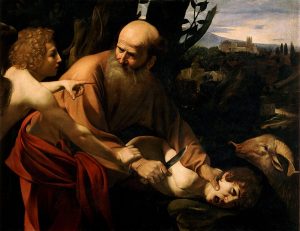Thoughts on Sunday’s Lessons for June 28, 2020
First Reading (Track One): Genesis 22:1-14
We reflect on sacrifices as small as the gift of water to a child and as serious as the death of a child in Sunday’s Track One readings.

Sacrifice of Isaac (c.1603), oil painting on canvas by Michelangelo Merisi da Caravaggio (1571-1610). Uffizi Museum, Florence, Italy. (Click image to enlarge.)
Having sent his son, Ishmael, into the desert with his mother to die, as we heard in last Sunday’s reading, Abraham now receives an even more shocking command: God tells him to slay his beloved son Isaac as a sacrifice. What in Heaven’s name is going on here? Perhaps the easy answer is to recognize that these are these are ancient legends, difficult for us to understand in our own context, and not intended to be taken literally even in their original setting. For the ancients, perhaps this narrative showed that God does not desire human sacrifice. It reveals a compassionate God who, having subjected Abraham to a harsh test, then ultimately says “no” to death.
First Reading (Track One): Jeremiah 28:5-9
To understand this Track Two first reading, it is helpful to have the context of the verses just preceding it. Jeremiah had warned the priests and people of Israel in exile that their sojourn in Babylon had a long way to go, and that any prophets who told them otherwise were liars. Then the young prophet Hananiah stood up and challenged Jeremiah, prophesying that God had in fact broken the yoke of the Babylonian king and would bring all the exiles home within two years. Now in this short passage, Jeremiah responds. He agrees that God will indeed end the exile some day, but that will happen only when peace prevails and war, pestilence and famine come to an end.
Psalm (Track One): Psalm 13
At first glance, this Psalm might not seem the best choice to read to someone who is grieving or afraid. The Psalmist speaks from the depths of fear and loss, suffering deep pain. Has God’s face turned away, leaving him alone and defenseless? But even in this dark place, hope remains; for God’s love is steadfast and abiding. God has been just and fair, and the Psalmist trusts that God will remain so.
Psalm (Track Two): Psalm 89:1-4,15-18
These two excerpts taken from a longer Psalm celebrate God’s covenant with King David, a royal lineage that God established to last forever as a sign of God’s righteousness and never-ending rule. Those who walk in God’s way and rejoice in the divine name will be full of joy, knowing that God is their ruler, the Psalmist sings: The Holy One of Israel is everlasting king.
Second Reading: Romans 6:12-23
Paul uses the idea of slavery to make his point in Sunday’s passage from his letter to the Romans: Through Christian baptism we have been spared from the slavery of sin, freeing us to joyously embrace a better kind of slavery, the “enslavement” of willing submission to God through Christ. In this way, Paul writes, we receive the free gift of grace that brings eternal life.
Gospel: Matthew 10:40-42
This is the third and final Sunday Gospel passage from Matthew’s account of Jesus teaching his recently commissioned apostles. In the first two readings we heard him warn about the challenges of discipleship. Now Jesus tells them about the rewards of following his way. Immediately following his troubling warning that those who follow him must leave friends and family behind, Jesus now echoes the Psalmist’s promise that God will be just and fair. Jesus promises that those who practice justice in his name – even in such small ways as offering water to a child – will receive God’s justice.
